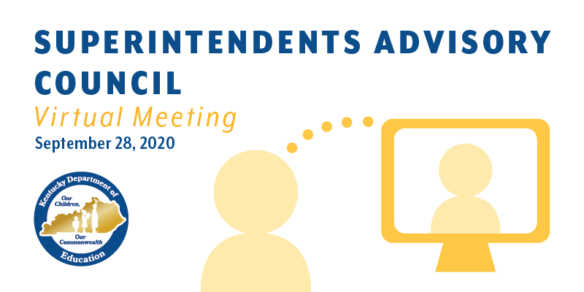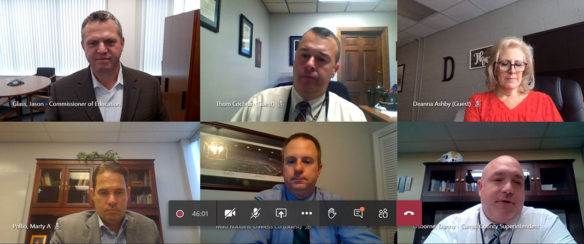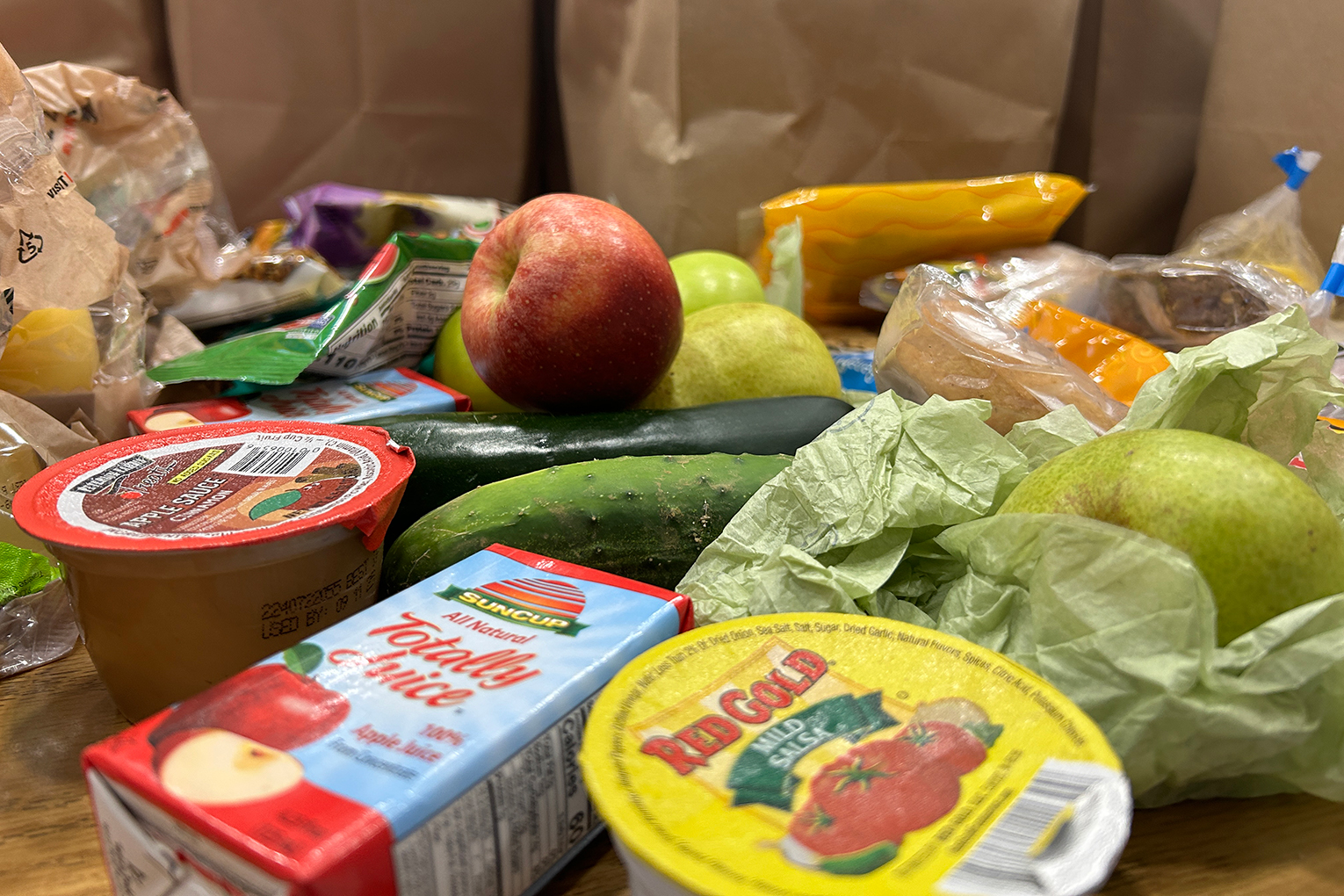
- Many Superintendent Advisory Council members said they would like to see KDE continue to emphasize equity in all aspects of education and closing achievement gaps.
- Commissioner Jason E. Glass said KDE will work on developing an electronic question-and-answer format so the state’s education community also can provide feedback to the department.
By Jacob Perkins
Jacob.perkins@education.ky.gov
In his first meeting with the Superintendents Advisory Council (SAC) on Sept. 28, Kentucky’s Education Commissioner Jason E. Glass held a virtual question-and-answer session to allow members to ask questions of him and the Kentucky Department of Education (KDE) and to better get to know members and their districts.
Glass, who officially began his role as Kentucky’s commissioner of education on Sept. 15, began the meeting by asking each council member to introduce themselves and talk about their districts.
On Aug. 10, Gov. Andy Beshear recommended that Kentucky schools delay in-person instruction until Sept. 28. Based on the superintendent’s introductions during the meeting, Kentucky districts have implemented a variety of strategies for reopening, with some delaying instruction and others using a different plan.
Washington County, for example, began on Sept. 1 with a hybrid model that utilizes both in-person and online learning. Students were divided into groups based on their last name, and the district used Wednesday as a deep-cleaning day. All students returned to in-person instruction full-time on Sept. 28, said Superintendent Robin Cochran.
Jefferson County, on the other hand, will continue all-virtual learning and hopes to return to in-person learning on Oct. 22, said Superintendent Marty Pollio.
Glass asked for feedback from the superintendents using a tool he has developed when he starts in a new organization. The tool asked them to think about what Kentucky’s education community should:
- KEEP Doing – Things we value, that bring us meaning and pride, the “right” work.
- STOP Doing – Things that are not of value, that don’t have meaning or purpose, or are antithetical to our values as a Commonwealth.
- START Doing – Things we should aspire toward, work to put in place, build capacity around.
Glass said KDE will work on developing an electronic question-and-answer format so the state’s education community also can provide feedback.
“Our hope is to take all of this data that we gather and do a text analysis on it and see what themes emerge,” he said. “I think it’s going to be a really exciting way to look at education in the state.”
Keep Doing
Many council members said they would like to see KDE continue to emphasize equity in all aspects of education and closing achievement gaps.
On Sept. 24, Glass released a statement on racial equity in the Commonwealth.
“I want to assure you that the Kentucky Department of Education is committed to helping our schools and districts serve students equitably, work toward more inclusive schools and to help our students and educators learn how to support students dealing with racial trauma,” Glass said in his statement.
In addition, KDE staff have now participated in three implicit bias trainings with Eastern Kentucky University’s Roger Cleveland, associate professor of educational leadership and policy studies.
Mark Kopp, superintendent of Franklin County Public Schools, said one element he has been impressed with is KDE’s vision of finding a path for every student.
“It’s not just about college readiness. Career readiness is very important,” he said.
Campbell County Superintendent David Rust said he has been pleased with how KDE has handled COVID-19.
“The department has really worked to identify areas where we could waive regulation … and pursue things that would help us through the pandemic,” he said.
Rust expressed gratitude for having the Non-Traditional Instruction Program available to districts when in-person instruction was no longer an option due to public health concerns.
Stop Doing
The council members raised concerns over how funding is handled for new and renovated buildings, specifically with the Model Program, which they said was outdated and needs to be revised.
Another main topic was Kentucky’s accountability system. Greg Schultz, superintendent of Oldham County Public Schools, said teachers in his district taught harder last spring when there was no state test required at the end of the year.
Pollio said another issue with the accountability system is the state assigning labels to schools.
“We went through several years of debate of whether it should be a letter grade and our state settled on a star system,” he said. “I was a principal for two years at a school that would be considered by many perspectives a failing school. I would put the faculty and staff at that school up against anyone in the state for the work that we did during that time.”
Though Pollio is in favor of an accountability system, he said it is difficult for an entire school community when they have a label stamped on them.
Start Doing
Calloway County Superintendent Tres Settle said he hopes the department will work to develop a statewide online school for Kentucky’s students.
“I think it could advantageous for all of us and could be a means where we could all save on resources,” he said.
Oldham County’s Schultz also said he would like to see the department provide more support and guidance surrounding mental health.
“It seems to be overwhelming at times to think of what teachers are being asked to face and what principals are being asked to face with not a whole lot of prior knowledge,” said Schultz.
Bellevue Independent Superintendent Robb Smith said he hopes that as Kentucky begins to move forward, public education will be able to tell its own story and districts will be able to communicate the positives happening in their schools.
“I think we really need to start coming together to tell (our own story) and the great things that go on in public education,” he said.
 Additional Questions
Additional Questions
Doug Bennett, superintendent of Laurel County Public Schools, said his district has recently fallen into the red category on the color-coded COVID-19 metric developed by the Kentucky Department for Public Health (DPH), designed to help local school districts decide when they needed to switch to online instruction.
However, Bennett said Laurel County’s numbers are inflated due to a rise in cases at a local nursing home.
“These are residential settings,” said Bennett. “Districts that have one or two nursing homes are going to have a higher number very quickly.”
Based on the metric, sports and all extracurricular activities must be suspended. Only essential staff should regularly be in school buildings, still adhering to Healthy at School guidance. Essential student support services, such as providing meals, should continue. Small groups of students can be allowed in schools for targeted services. All these measures should remain in effect until the community returns to yellow status.
Bennet asked Glass if there have been any discussions between KDE and DPH on updating the metric so that facilities like nursing homes are not having an impact on school decisions.
Glass said there had not, as the metric “was provided as guidance for local school districts to look at and see the positivity rate in their community and make an informed decision around what the right learning model was for that community.
“Public health has said this is something you need to look at and take into account. It should trigger conversations at the local district.”
Regarding DPH’s requirement for districts to self-report COVID-19 cases to their communities, Bennet said he and several of his colleagues feel uneasy reporting unconfirmed cases and asked if that is still being required of districts.
On Sept. 14, DPH issued an emergency administrative regulation, signed by Gov. Beshear, which requires parents, guardians or other caregivers to notify their child’s schools within 24 hours if a student tests positive for COVID-19.
“The Department for Public Health have not asked for schools to validate or confirm any of that,” explained Glass. “It’s simply were you made aware of a positive case or a quarantine? Was that information provided to the school? If yes, then you need to report that information.”
The SAC will meet again on Oct. 12.
Previous Coverage of the Superintendents’ Advisory Council




Leave A Comment